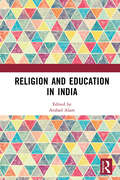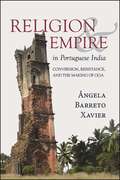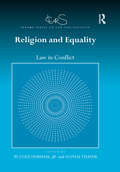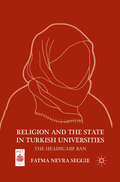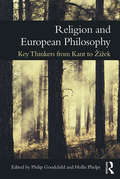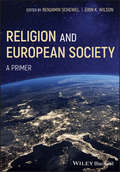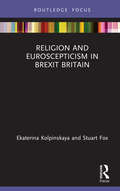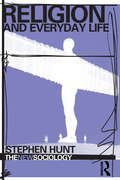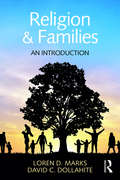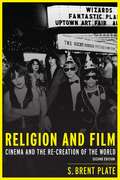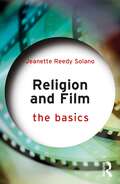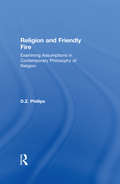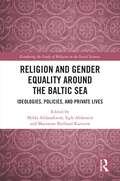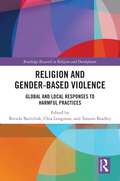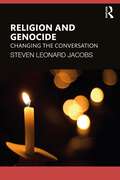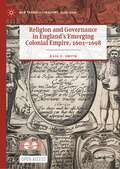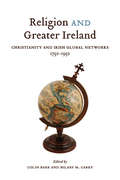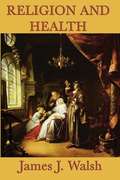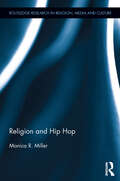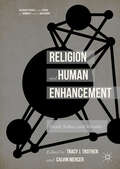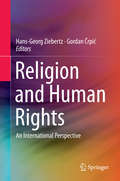- Table View
- List View
Religion and Education in India
by Arshad AlamThis book studies the relationship between religion and education in the Indian context. It analyses the creative interface between religion and education as empirical categories and overlapping modes of pedagogical transmission. The volume investigates the ways in which religious identities are shaped through education both at home and at school. It brings together academics and researchers working in different faith traditions like Islam, Hinduism, and Sikhism to understand the significance of transmitting religious education and the need to pay closer attention to sites through which religious instruction is being disseminated. Topical and lucid, this book will be an important reading for scholars and researchers of sociology, religious studies, secularism, sociology of education, political sociology, South Asia studies, and education in general.
Religion and Empire in Portuguese India: Conversion, Resistance, and the Making of Goa
by Ângela Barreto XavierExamines the colonization of Goa in the sixteenth and seventeenth centuries and the durability of Portuguese rule.How did the colonization of Goa in the sixteenth and seventeenth centuries take place? How was it related to projects for the conversion of Goan colonial subjects to Catholicism? In Religion and Empire in Portuguese India, Ângela Barreto Xavier examines these questions through a reading of the relevant secular and missionary archives and texts. She shows how the twin drives of conversion and colonization in Portuguese India resulted in a variety of outcomes, ranging from negotiation to passive resistance to moments of extreme violence. Focusing on the rural hinterlands rather than the city of Goa itself, Barreto Xavier shows how Goan actors were able to seize hold of complex cultural resources in order to further their own projects and narrate their own myths and histories. In the process, she argues, Portuguese Goa emerged as a space with a specific identity that was a result of these contestations and interactions. The book de-essentializes the categories of colonizer and colonized, making visible instead their inner-group diversity of interests, their different modes of identification, and the specificity of local dynamics in their interactions and exchanges-in other words, the several threads that wove the fabric of colonial life.
Religion and Equality: Law in Conflict (ICLARS Series on Law and Religion)
by W. Cole Durham Jr. Donlu D ThayerThis volume presents an analysis of controversial events and issues shaping a rapidly changing international legal, political, and social landscape. Leading scholars and experts in law, religious studies and international relations, thoughtfully consider issues and tensions arising in contemporary debates over religion and equality in many parts of the world. The book is in two parts. The first section focuses on the anti-discrimination dimension of religious freedom norms, examining the developing law on equality and human rights and how it operates at international and national levels. The second section provides a series of case studies exploring the contemporary issue of same-sex marriage and how it affects religious groups and believers. This collection will be of interest to academics and scholars of law, religious studies, political science, and sociology, as well as policymakers and legal practitioners.
Religion and Ethics in a Globalizing World: Conflict, Dialogue, and Transformation (Middle East Today)
by Luca Anceschi Joseph Anthony Camilleri Ruwan Palapathwala Andrew WickingThis book explores educational and cultural experiences of 'part-time' unveilers during their undergraduate degree programs in public institutions in Turkey. The term 'part-time unveiler' refers to undergraduate female students who cover their hair in their private lives but who remove the headscarf while at a Turkish university.
Religion and Ethnicity in Canada
by Paul Bramadat David SeljakAs the leading book in its field, Religion and Ethnicity in Canada has been embraced by scholars, teachers, students, and policy makers as a breakthrough study of Canadian religio-ethnic diversity and its impact on multiculturalism. A team of established scholars looks at the relationships between religious and ethnic identity in Canada's six largest minority religious communities: Hindus, Buddhists, Sikhs, Jews, Muslims and practitioners of Chinese religion. The chapters also highlight the ethnic diversity extant within these traditions in order to offer a more nuanced appreciation of the variety of lived experiences of members of these communities.Together, the contributors develop consistent themes throughout the volume, among them the changing nature of religious practice and ideas, current demographics, racism, and the role of women. Chapters related to the public policy issues of healthcare, education and multiculturalism show how new ethnic and religious diversity are challenging and changing Canadian institutions and society. Comprehensive and insightful, Religion and Ethnicity in Canada makes a unique contribution to the study of world religions in Canada.
Religion and European Philosophy: Key Thinkers from Kant to Žižek
by Philip Goodchild Hollis PhelpsReligion and European Philosophy: Key Thinkers from Kant to Žižek draws together a diverse group of scholars in theology, religious studies, and philosophy to discuss the role that religion plays among key figures in the European philosophical tradition. Designed for accessibility, each of the thirty-four chapters includes background information on the key thinker, an overview of the main themes, concepts, and concerns that occupy his or her attention, and a discussion of the religious and theological elements present in his or her thought, in light of contemporary issues. Given the scope of the volume, Religion and European Philosophy will be the go-to guide for understanding the religious and theological dimensions of European philosophy, for both students and established researchers alike.
Religion and European Philosophy: Key Thinkers from Kant to Žižek
by Philip Goodchild Hollis PhelpsReligion and European Philosophy: Key Thinkers from Kant to Žižek draws together a diverse group of scholars in theology, religious studies, and philosophy to discuss the role that religion plays among key figures in the European philosophical tradition. Designed for accessibility, each of the thirty-four chapters includes background information on the key thinker, an overview of the main themes, concepts, and concerns that occupy his or her attention, and a discussion of the religious and theological elements present in his or her thought, in light of contemporary issues. Given the scope of the volume, Religion and European Philosophy will be the go-to guide for understanding the religious and theological dimensions of European philosophy, for both students and established researchers alike.
Religion and European Society: A Primer
by Erin K. Wilson Benjamin SchewelA contemporary examination of the role of religion in the European public sphere and beyond Although the role of religion has arguably declined in the societies of Western and Northern Europe, religious participation in other parts of the continent and among growing immigrant communities remains an important aspect of daily life. Recent years have seen a resurgence of religion in the public sphere, prompting many researchers to view European secularism as an outlier in this global trend. Religion and European Society: A Primer presents recent academic literature that explores key developments and current debates in the field, covering topics such as changing patterns of belief, religion across the political spectrum, and development and humanitarian aid. Articles written by leading scholars draw from well-established findings to help readers contemplate the role of religion in public life, understand the assumptions and underpinnings of the secular worldview, and develop new ways of thinking about global issues relevant to contemporary global affairs. Each theme is addressed by several articles to provide readers with diverse, sometimes competing perspectives. This volume offers concepts and ideas that can be used in various policy, practitioner, and academic settings—clarifying overarching concepts and trends rather than analyzing specific policy issues that can quickly become outdated. Addresses issues of contemporary importance such as demographic changes in religious observance, increased immigration, the emergence of new religious movements, and changes in more established religions Explores the ethical and philosophical concepts as well as the practical, everyday consequences of European post-secularism Challenges widespread assumptions about the secular nature of the modern public sphere Offers analytical tools as well as practical policy recommendations on a range of issues including media, regulation, gender, conflict and peacebuilding, immigration and humanitarianism. Designed to move research findings from academic journals to the realm of public discourse, Religion and European Society: A Primer is a valuable source of information for practitioners within and outside of Europe of religious studies, politics, and international affairs.
Religion and Euroscepticism in Brexit Britain (Routledge Focus on Religion)
by Stuart Fox Ekaterina KolpinskayaReligion has a significant effect on how Europeans feel about the European Union (EU) and has had an important impact on how people voted in the UK’s ‘Brexit referendum’. This book provides a clear and accessible quantitative study of how religion affects Euroscepticism and political behaviour. It examines how religion has affected support for EU membership since the UK joined the European Economic Community, through to the announcement of the Brexit referendum in 2013, to the referendum itself in 2016. It also explores how religion continues to affect attitudes towards the EU post-Brexit. The volume provides valuable insights into why the UK voted to leave the EU. Furthermore, it highlights how religion affects the way that citizens throughout Europe assess the benefits, costs and values associated with EU membership, and how this may influence public opinion regarding European integration in the future. This timely book will be of important interest to academics and students focusing on religion and public attitudes, contemporary European and British politics as well as think tanks, interest groups and those with an interest in understanding Brexit.
Religion and Everyday Life (The New Sociology)
by Stephen HuntThis introductory text explores the historical and contemporary relevance of religion to social life, through an examination of practice and belief. Author Hunt reconsiders how theories and concepts are lived at the level of selfhood and cultural identity, through religious and spiritual belief. At the same time he looks at contemporary changes in religious life and how these are impacted by socialization, institutional belonging, and belief, and at the significance of class, gender, age and ethnicity. Individual chapters cover a range of issues, such as: religion, identity and community secularization and pluralism traditional Christianity: change and continuity globalization and the global context religion and ethnicity. The text challenges much current sociological thought and deals with contemporary Christianity, a range of world faiths and new and developing expressions of religion and spirituality. With tables and diagrams to illustrate key points and trends, it provides an accessible and captivating introduction to the sociology of religion.
Religion and Families: An Introduction (Textbooks in Family Studies)
by Loren D. Marks David C. DollahiteThis is the first multidisciplinary text to address the growing scholarly connection between religion and family life. The latest literature from family studies, psychology, sociology, and religion is reviewed along with narratives drawn from interviews with 200 racially, religiously, and regionally diverse families which bring the concepts to life. Written in a thought-provoking, accessible, and sometimes humorous style by two of the leading researchers in the field, the book reflects the authors’ firsthand experience in teaching today’s students about religion’s impact on families. Prior to writing the book, the authors read the sacred texts of many faiths, interviewed religious leaders, and attended religious services for a wide array of faiths. The result is an accurate and engaging account of why and how families are impacted by their religion. The pedagogical features of the text include boldfaced key terms defined in the glossary, text boxes, chapter conclusions, summary points, and review questions. Religion and Families: Examines several denominations within Christianity, Judaism, and Islam. Reviews findings from racially and ethnically diverse families, from traditional and diverse family forms, and examines gender and life-course issues. Addresses the impact of one’s religious involvement on longevity, divorce rates, and parenting styles. Considers demographic, family-, couple-, and individual-level data that relate to prayer and other sacred practices. Presents a balanced treatment of the latest research and a new model for studying family and religion. Explores the "whys," "hows," and processes at work in the religion-family connection. The book opens with a discussion of why religion and family connections matter. Chapter 2 defines religion and presents a new conceptualization of religion. Empirical research connections between religion and marriage, divorce, family, and parent-child relationships are explored in chapters 3 through 6. The interface between religion and the family in Christianity, Judaism, and Islam are reviewed in chapters 7, 8, and 9. Chapter 10 explores the unique challenges that religion presents for diverse family forms. Prayer as a coping mechanism for life’s challenges such as death and disability are explored in chapter 11. Chapter 12 examines forgiveness in the context of marriages and families. The book concludes with a review of the book’s most important themes and findings. Intended as a text for undergraduate courses in family and religion, the psychology or sociology of the family, the psychology or sociology of religion, pastoral/biblical counseling, or family and youth ministry, taught in human development and family studies, psychology, sociology, religion, social work, pastoral counseling, and sometimes philosophy. This book also appeals to family therapists and counselors.
Religion and Film: Cinema and the Re-creation of the World (Critical Concepts In Media And Cultural Studies)
by S. Brent PlateReligion and cinema share a capacity for world making, ritualizing, mythologizing, and creating sacred time and space. Through cinematography, mise-en-scène, editing, and other production activities, film takes the world “out there” and refashions it. Religion achieves similar ends by setting apart particular objects and periods of time, telling stories, and gathering people together for communal actions and concentrated focus. The result of both cinema and religious practice is a re-created world: a world of fantasy, a world of ideology, a world we long to live in, or a world we wish to avoid at all costs.Religion and Film introduces readers to both religious studies and film studies by focusing on the formal similarities between cinema and religious practices and on the ways they each re-create the world. Explorations of film show how the cinematic experience relies on similar aesthetic devices on which religious rituals have long relied: sight, sound, the taste of food, the body, and communal experience. Meanwhile, a deeper understanding of the aesthetic nature of religious rituals can alter our understanding of film production. Utilizing terminology and theoretical insights from the study of religion as well as the study of film, Religion and Film shows that by paying attention to the ways films are constructed, we can shed new light on the ways religious myths and rituals are constructed and vice versa.This thoroughly revised and expanded new edition is designed to appeal to the needs of courses in religion as well as film departments. In addition to two new chapters, this edition has been restructured into three distinct sections that offer students and instructors theories and methods for thinking about cinema in ways that more fully connect film studies with religious studies.
Religion and Film: The Basics (The Basics)
by Jeanette Reedy SolanoReligion and Film: The Basics is an accessible and engaging introduction to the history, diverse approaches, and ideas associated within the study of religion and film. Referencing films from around the world from the early 20th century to the present day, this unique introduction includes the following topics: the history and dynamics of religion and film various methods to approach religion and film the evolution of religion and film scholarship film genre and theory world religions and film unique themes—from race and gender roles to karma and redemption A fascinating range of films are discussed, from early silent films such as Hypocrites to recent releases such as Minari. Five genres are explored, including horror in The Wicker Man (UK) and Let the Right One In (Sweden), and world religions are analyzed in films such as OMG, The Big Lebowski, and Malcolm X. Tropes examined include gender in Water, karma in It’s a Wonderful Life, death in Biutiful, redemption in Magnolia, and evil in Get Out. With helpful features including recommendations for further study and key films to view, this book is an ideal starting point for students approaching religion and film for the first time as well as those interested in learning more about the field while broadening their methods, knowledge of film, and their film canon.
Religion and Freedom of Thought
by Reinhold Niebuhr Perry Miller Robert L. Calhoun Nathan M. Pusey Henry P. Van DusenWritings on this subject by scholars.
Religion and Friendly Fire: Examining Assumptions in Contemporary Philosophy of Religion
by D.Z. PhillipsIn locating friendly fire in contemporary philosophy of religion, D.Z. Phillips shows that more harm can be done to religion by its philosophical defenders than by its philosophical despisers. Friendly fire is the result of an uncritical acceptance of empiricism, and Phillips argues that we need to examine critically the claims that individual consciousness is the necessary starting point from which we have to argue: for the existence of an external world and the reality of God; that God is a person without a body, a pure consciousness; and that to assent to a religious belief is essentially to assign a truth value to a proposition independent of any confessional context. When these products of friendly fire are avoided, we arrive at a new understanding of belief, trust and the soul, and refuse to say more or less than we know about the realities of human life in the service of religious apologetics.
Religion and Gender Equality around the Baltic Sea: Ideologies, Policies, and Private Lives (Gendering the Study of Religion in the Social Sciences)
by Marianne Bjelland Kartzow Milda Ališauskienė Eglė AleknaitėThis volume aims to rethink the intersections of gender and religion, as well as the secular and religious, in implementing and challenging gender equality at individual, institutional, and societal levels in the regions around the Baltic Sea. Acknowledging the diversity of societies and the significance of socio-historical contexts, the empirical data discussed in this book draw attention to the under-researched region of post-socialist Baltic states. The analyses presented in the chapters are based on fieldwork carried out in Lithuania, Latvia, Estonia, and Norway. This volume includes sociological, anthropological, historical, political science, and theological perspectives and covers five broad research areas: a shifting concept of gender equality and its developments in Baltic and Nordic countries; a diversity of developments within religious groups related to issues of gender equality and the negotiation of competing gender ideologies; inter-religious developments and gender equality; the role of religions in the construction of public discourse on gender equality; and religious socialization, focusing on the promotion of religious gender models through socialization and public education.
Religion and Gender-Based Violence: Global and Local Responses to Harmful Practices (Routledge Research in Religion and Development)
by Tamsin Bradley Chia Longman Brenda BartelinkThis book takes religion as an entry point for a deeper exploration into why practices of gender-based violence continue and what possible actions might help to contribute to their eradication. International donors are committed to reducing and ending gender-related harm, particularly violence against women, but clear answers as to why harmful practices persist are often slow to emerge. Theological research struggles to find strong links, yet religion is often referred to by local people as the reason for practices such as female cutting, male circumcision, early and forced marriage, nutritional taboos and birth practices, mandatory (un)veiling, harmful spiritual practices, polygamy, gender unequal marital and inheritance rights and so-called honour crimes. This book presents empirical cases of religious, non-religious and secular actors, including local and international governmental and non-governmental agencies in the fields of development, health and equality policies. Tracing their different understandings of how religion is entangled with gender-based violence both contextually as well as historically, the book sheds light on helpful and unhelpful as well as erroneous and harmful understandings of such practices in local and global perspectives. Centralising the perspectives of women themselves, this book will be an important read for development practitioners and policy makers, as well as for researchers across religious studies, gender studies, and global development.
Religion and Genocide: Changing the Conversation
by Steven Leonard JacobsReligion and Genocide: Changing the Conversation is a cutting-edge introduction to the complex and controversial relationship between religion and genocide. This book aims to widen the reader’s understanding of religion and those who practice it, the nexus of religion and violence, and those who legitimate their violence by framing it in religious terms by looking at notions of holy wars, religious wars, and genocide and the practitioners of such. This book delves into our current thinking of ourselves as biological entities, our relationship to genocide, and the impact of geography (including climate change) and diseases on our humanity and our ability to commit genocide. Tying together all these seemingly disparate threads, this text concludes with the significant and still largely unanswered question: "Where do we go from here?". Highlighting the complex relationship between religion and genocide, this is an essential read for students and academics studying religion and violence, Judaism, Judaic studies, and holocaust and genocide studies. Religion and Genocide will also be of interest to researchers in related subjects such as history, politics, sociology, and anthropology.
Religion and Governance in England’s Emerging Colonial Empire, 1601–1698 (New Transculturalisms, 1400–1800)
by Haig Z. SmithThis open access book explores the role of religion in England's overseas companies and the formation of English governmental identity abroad in the seventeenth century. Drawing on research into the Virginia, East India, Massachusetts Bay, Plymouth, New England and Levant Companies, it offers a comparative global assessment of the inextricable links between the formation of English overseas government and various models of religious governance across England's emerging colonial empire. While these approaches to governance varied from company to company, each sought to regulate the behaviour of their personnel, as well as the numerous communities and faiths which fell within their jurisdiction. This book provides a crucial reassessment of the seventeenth-century foundations of British imperial governance.
Religion and Greater Ireland
by Hilary M. Carey Colin BarrImpelled by economic deprivation at home and spiritual ambition abroad, nineteenth-century Irish clerics and laypeople reshaped the many sites where they came to pray, preach, teach, trade, and settle. So decisive was the role of religion in the worlds of Irish settlement that it helped to create a "Greater Ireland" that encompassed the entire English-speaking world and beyond. Rejecting the popular notion that the Irish were passive victims of imperial oppression, Religion and Greater Ireland demonstrates how religion opened up a vast world to exploit. The religious free market of the United States and the British Empire provided an opportunity and a level playing-field in which the Irish could compete and thrive. Contributors to this collection show how the Irish of all denominations contributed to the creation and extension of Greater Ireland through missionary and temperance societies, media, and the circulation of people, ideas, and material culture around the world. Essays also detail the diverse experiences of Irish immigrants, whether they were Catholics or Protestants, clergy or laypeople, women or men, in sites of settlement and mission including the United States, Canada, South Africa, Asia, Australia, New Zealand, and Ireland itself. Seeking to illuminate the interconnections and commonalities of the Irish migrant experience, Religion and Greater Ireland provides fascinating insight into the range of influences that Ireland's religions have had on the world beyond the British Isles.
Religion and Greater Ireland: Christianity and Irish Global Networks, 1750-1969 (McGill-Queen's Studies in the History of Religion)
by Hilary M. Carey Colin BarrImpelled by economic deprivation at home and spiritual ambition abroad, nineteenth-century Irish clerics and laypeople reshaped the many sites where they came to pray, preach, teach, trade, and settle. So decisive was the role of religion in the worlds of Irish settlement that it helped to create a "Greater Ireland" that encompassed the entire English-speaking world and beyond. Rejecting the popular notion that the Irish were passive victims of imperial oppression, Religion and Greater Ireland demonstrates how religion opened up a vast world to exploit. The religious free market of the United States and the British Empire provided an opportunity and a level playing-field in which the Irish could compete and thrive. Contributors to this collection show how the Irish of all denominations contributed to the creation and extension of Greater Ireland through missionary and temperance societies, media, and the circulation of people, ideas, and material culture around the world. Essays also detail the diverse experiences of Irish immigrants, whether they were Catholics or Protestants, clergy or laypeople, women or men, in sites of settlement and mission including the United States, Canada, South Africa, Asia, Australia, New Zealand, and Ireland itself. Seeking to illuminate the interconnections and commonalities of the Irish migrant experience, Religion and Greater Ireland provides fascinating insight into the range of influences that Ireland’s religions have had on the world beyond the British Isles.
Religion and Health
by James J. WalshJames Joseph Walsh, M.D., LL.D., Litt.D., Sc.D. (1865-1942) was an American physician and author, born in New York City. He graduated from Fordham College in 1884 and from the University of Pennsylvania (M.D.) in 1895. After postgraduate work in Paris, Vienna, and Berlin, he settled in New York.
Religion and Hip Hop: Mapping The New Terrain (Routledge Research in Religion, Media and Culture #3)
by Monica R. MillerReligion and Hip Hop brings together the category of religion, Hip Hop cultural modalities and the demographic of youth. Bringing postmodern theory and critical approaches in the study of religion to bear on Hip Hop cultural practices, this book examines how scholars in religious and theological studies have deployed and approached religion when analyzing Hip Hop data. Using existing empirical studies on youth and religion to the cultural criticism of the Humanities, Religion and Hip Hop argues that common among existing scholarship is a thin interrogation of the category of religion. As such, Miller calls for a redescription of religion in popular cultural analysis - a challenge she further explores and advances through various materialist engagements. Going beyond the traditional and more common approach of analyzing rap lyrics, from film, dance, to virtual reality, Religion and Hip Hop takes a fresh approach to exploring the paranoid posture of the religious in popular cultural forms, by going beyond what "is" religious about Hip Hop culture. Rather, Miller explores what rhetorical uses of religion in Hip Hop culture accomplish for various and often competing social and cultural interests.
Religion and Human Enhancement
by Calvin Mercer Tracy J. Trothen"Transhumanism" or "human enhancement" is an intellectual and cultural movement that advocates the use of emerging technologies to change human traits. Although they may sound like science fiction, the possibilities suggested by transhumanism are very real, and the questions they raise have no easy answers. If these enhancements especially major ones like the indefinite extension of healthy human life become widely available, they would arguably have a more radical impact on humankind than any other development in history. This book comprises essays that explore transhumanism and the issues that surround it, addressing numerous fascinating questions posed by scholars of religion from various traditions. How will "immortality" or extreme longevity change our religious beliefs and practices? How might pharmaceuticals enhance spiritual experiences? Will "post-human" technologies be available to all persons, or will a superior "post-human race" arise to dominate the human species? The discussions are as intriguing as the future they suggest. "
Religion and Human Rights
by Hans-Georg Ziebertz Gordan ČrpićThis book examines the relationship between human rights and religiosity. It discusses whether the impact of religiosity on human rights is liberational or suppressive, and sheds light on the direction in which the relationship between religion and human rights is expected to develop. The questions explored in this volume are: Which are the rights that are currently debated or under pressure? What is the position on human rights that churches and religious communities represent? Are there tensions between churches, religious communities and the state? Which rights are especially relevant for young people and which relate to adolescents life-world experiences? Covering 17 countries, the book describes two separate, yet connected studies. The first study presents research by experts from individual countries describing the state of human rights and neuralgic points anticipated in individual societies. The other study presents specific findings on the relationship between these two social phenomena from empirical research in a population of high school students. Studying this particular population allows insights into social trends, value systems and attitudes on human rights, as well as an indication of the likely directions of development, and potential room for intervention.
